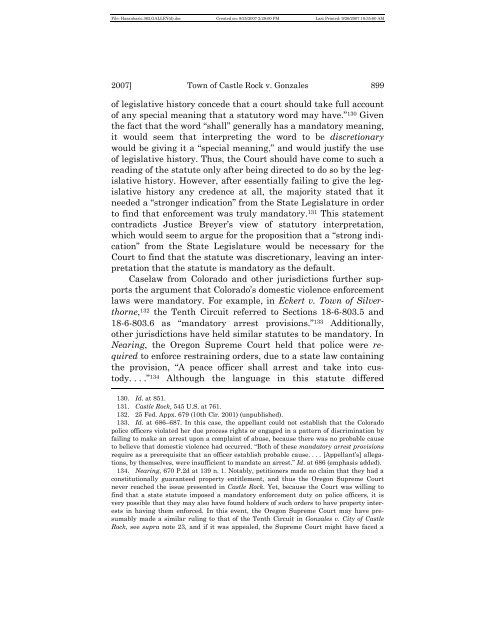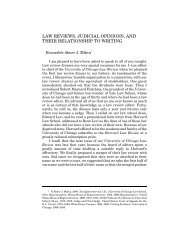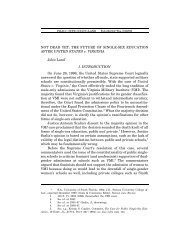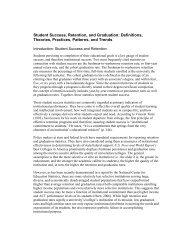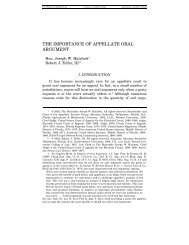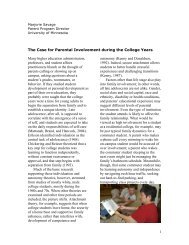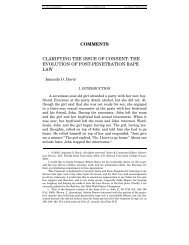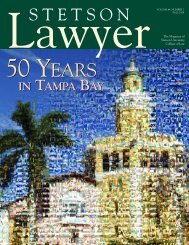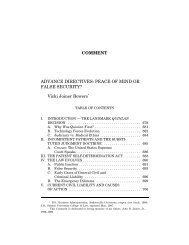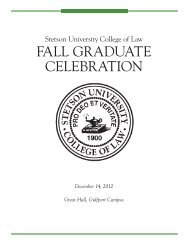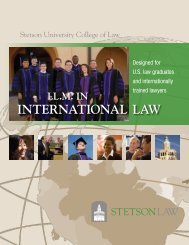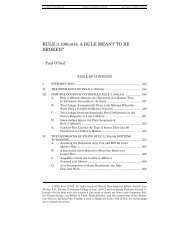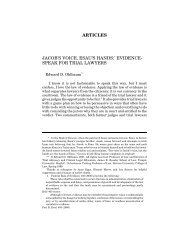TOWN OF CASTLE ROCK v. GONZALES: THE ... - Stetson University
TOWN OF CASTLE ROCK v. GONZALES: THE ... - Stetson University
TOWN OF CASTLE ROCK v. GONZALES: THE ... - Stetson University
You also want an ePaper? Increase the reach of your titles
YUMPU automatically turns print PDFs into web optimized ePapers that Google loves.
File: Hasanbasic.362.GALLEY(d).doc Created on: 9/25/2007 2:29:00 PM Last Printed: 9/26/2007 10:35:00 AM2007] Town of Castle Rock v. Gonzales 899of legislative history concede that a court should take full accountof any special meaning that a statutory word may have.” 130 Giventhe fact that the word “shall” generally has a mandatory meaning,it would seem that interpreting the word to be discretionarywould be giving it a “special meaning,” and would justify the useof legislative history. Thus, the Court should have come to such areading of the statute only after being directed to do so by the legislativehistory. However, after essentially failing to give the legislativehistory any credence at all, the majority stated that itneeded a “stronger indication” from the State Legislature in orderto find that enforcement was truly mandatory. 131 This statementcontradicts Justice Breyer’s view of statutory interpretation,which would seem to argue for the proposition that a “strong indication”from the State Legislature would be necessary for theCourt to find that the statute was discretionary, leaving an interpretationthat the statute is mandatory as the default.Caselaw from Colorado and other jurisdictions further supportsthe argument that Colorado’s domestic violence enforcementlaws were mandatory. For example, in Eckert v. Town of Silverthorne,132 the Tenth Circuit referred to Sections 18-6-803.5 and18-6-803.6 as “mandatory arrest provisions.” 133 Additionally,other jurisdictions have held similar statutes to be mandatory. InNearing, the Oregon Supreme Court held that police were requiredto enforce restraining orders, due to a state law containingthe provision, “A peace officer shall arrest and take into custody.. . .” 134 Although the language in this statute differed130. Id. at 851.131. Castle Rock, 545 U.S. at 761.132. 25 Fed. Appx. 679 (10th Cir. 2001) (unpublished).133. Id. at 686–687. In this case, the appellant could not establish that the Coloradopolice officers violated her due process rights or engaged in a pattern of discrimination byfailing to make an arrest upon a complaint of abuse, because there was no probable causeto believe that domestic violence had occurred. “Both of these mandatory arrest provisionsrequire as a prerequisite that an officer establish probable cause. . . . [Appellant’s] allegations,by themselves, were insufficient to mandate an arrest.” Id. at 686 (emphasis added).134. Nearing, 670 P.2d at 139 n. 1. Notably, petitioners made no claim that they had aconstitutionally guaranteed property entitlement, and thus the Oregon Supreme Courtnever reached the issue presented in Castle Rock. Yet, because the Court was willing tofind that a state statute imposed a mandatory enforcement duty on police officers, it isvery possible that they may also have found holders of such orders to have property interestsin having them enforced. In this event, the Oregon Supreme Court may have presumablymade a similar ruling to that of the Tenth Circuit in Gonzales v. City of CastleRock, see supra note 23, and if it was appealed, the Supreme Court might have faced a


